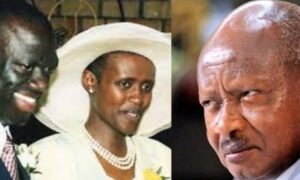Editor’s note: John Omoto analyses how Mutahi Kahiga remarks exposed Kenya’s tribal wound.
It began with a smirk, a microphone, and a moment that should never have been public.
Nyeri Governor Mutahi Kahiga, speaking in Kikuyu at a burial, mused that perhaps God had “intervened” through Raila Odinga’s death – that what had been planned politically was now in “total confusion”.
The words spread like wildfire. A 20-second clip tore through social media, igniting outrage and disbelief.
For many, it wasn’t just insensitivity – it was sacrilege. For others, it was political honesty spoken too crudely.
Kahiga had touched a raw nerve at a dangerous moment. Raila Odinga’s death had left Kenya in emotional flux, the opposition in mourning, and the ruling class quietly recalculating 2027.
His death wasn’t only a personal loss – it was a tectonic shift in Kenya’s political map.
Kahiga’s remark was interpreted as a confession of strategy. Without Raila, the opposition’s most potent rallying symbol is gone. “Now it’s total confusion,” he said – a statement that revealed more than he likely intended.
The backlash was immediate. ODM leaders called his words hate speech. The United Opposition demanded NCIC action. The Council of Governors distanced itself.
Within hours, Mutahi Kahiga resigned as vice-chair of the council, issuing an apology that sounded as reluctant as it was rehearsed.
Yet beneath the moral noise lay the real story – a struggle for political oxygen.
ODM politicians seized on Kahiga’s blunder, milking outrage to consolidate sympathy and relevance. With Raila gone, the opposition needed a villain. Kahiga was perfect: Kikuyu, UDA, blunt, and tone-deaf.
On the other side, Kahiga’s allies in UDA tiptoed. They condemned the tone, not the thought. His “divine intervention” talk was dressed as individual misjudgement, not systemic belief.
In Kenya’s high-stakes politics, even outrage is calibrated.

ODM Party has strongly condemned Mutahi Kahiga remarks. Photo/courtesy
The incident, stripped bare, exposes the truth about political mobilisation in Kenya: it is tribal, not ideological.
Parties are ethnic vessels, their slogans mere decoration. The NCIC can investigate Kahiga all it wants, but history is clear – few hate-mongers are ever punished.
The reason? Kenya’s politics feeds on ethnic belonging. The vote is not about policy; it is about protection. “Our turn to eat” is not a metaphor – it is a manifesto.
Politicians know this. They test the limits of decency, stir resentment, then retreat into apology.
The NCIC threatens, holds pressers, then fades. Justice is selective. Outrage is seasonal. In this climate, words like Kahiga’s are not slips – they are signals.
Since its creation, the NCIC has promised deterrence, but its impotence is structural. It lacks independence, teeth, and political cover. Every election cycle, the same script repeats: warnings, outrage, inaction.
To prosecute hatemongering politicians would require moral courage across tribal lines – and that rarely exists.
When a Kikuyu leader offends, Kikuyu elites cry persecution. When a Luo leader incites, Luo politicians claim witch-hunt. The institutions collapse under tribal weight.
This time will be no different. Mutahi Kahiga will likely survive the scandal, chastened but intact. The NCIC will issue a statement, perhaps open a file, and the story will fade.
Meanwhile, the 2027 race gathers steam. The vacuum Raila left behind is a marketplace of ambition.
Every remark, every misstep, every insult becomes political currency. The mourning of a national icon has turned into a contest for inheritance.
In that contest, Kahiga’s words are both symptom and symbol – of a nation unable to separate grief from politics or tribe from truth.
For all the outrage, the bigger tragedy is not what he said, but what it revealed: that even in death, Raila Odinga remains the mirror of Kenya’s divisions – a man whose absence exposes the fractures he spent a lifetime trying to bridge.
READ ALSO: Kikuyu Elders Who Endorsed Raila Concede Defeat, Insist They Made Right Choice
And as the dust settles in Nyeri, the country’s old ghosts stir again – tribal loyalties, cynical politics, and a hollow promise of unity.
In Kenya, death ends lives. But it never ends politics.
The opinions expressed in this article are solely those of the writer and do not necessarily reflect the position of GOTTA.news. We welcome writers to give their views on various social and political issues. Send your opinion to info@gotta.news.






















